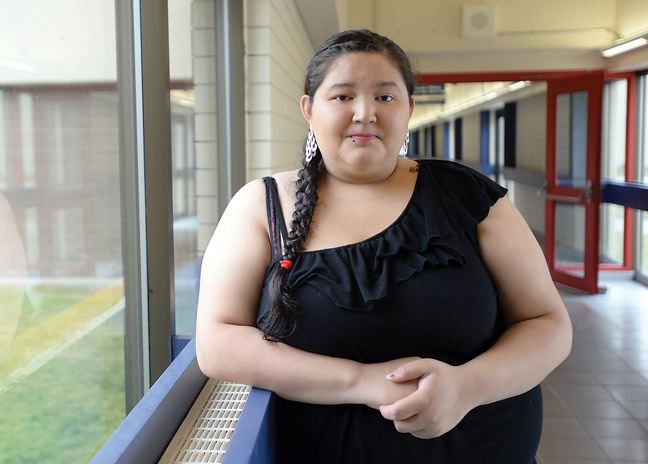Corina Duncan is quiet except when she talks about her two young boys.
"They like to wave and blow kisses. They just amaze me," says Duncan, 19. "If it wasn't for my boys I wouldn't be here right now."
Here is around the corner from the stage she'll walk across after passing the Teen Mothers' Alternative Program (TMAP). Her boys are the reason Duncan worked over the last three years to graduate high school, achieving her goal in May and taking part in the Centre for Learning Alternatives' valedictorian ceremony this week.
"They're really caring and loving, shy when they see new faces."
A little like their mother, perhaps. Duncan speaks tentatively and fidgets with her phone, softly stroking it with two thumbs as she speaks of her struggles.
Her father's death in 2007 was a shock. A couple years after his death, the family moved to Prince George from New Hazelton for a fresh start.
"It just felt really sad there," says Duncan, but she was still reeling from the pain of that loss. She couldn't focus, she drank a lot. By Grade 10, she'd dropped out of school.
"Ever since I lost him, I wasn't really myself," she says. "It took awhile for me to get back on my feet."
Getting pregnant with her first son Raydon, now two, changed all that, she says. She wanted to do something with her life, get educated for her young family. She joined the CLA's Teen Mothers' Alternative Program and started working toward her Dogwood Diploma.
"She's amazing," says her teacher Ruth Walter, who was there when the program launched in 1997.
To begin, it only had six girls signed up for the afternoon classes. By the end of the year, they had 26. It filled a gap in services she'd always known was there.
Now the program averages 30 to 45 mothers, but has had as many as 60 enrolled. It's designed for mothers like Duncan, aged 14-19, and has a continuous intake.
Often the girls will have dropped out as young as Grades 6, 7 and 8. Walter speaks of the many barriers they face, from transportation to housing to poverty.
"These girls are amazingly resilient," says Walter, and points to some of her graduates who are taking dental assisting and social work at the College of New Caledonia.
"I had faith. I knew they had a future," she says of their - and Duncan's - successes.
"I felt much more comfortable in TMAP than in public school," says Duncan, where she was bullied relentlessly. At the downtown facility in the Elizabeth Fry building, she got support.
Daycare was important for her, knowing that her two boys were nearby. Elizabeth Fry provides onsite care for infants up to age three.
TMAP practicum student Christine Kullmann-Taylor noted in an April 2015 project paper that childcare is considered a determinant of success for mothers.
"Knowing their children are safe and well cared for gives these mothers peace of mind to pursue their educational goals. However limited subsidized childcare options make it challenging for young mothers to continue their education beyond highschool and seek employment," wrote Kullmann-Taylor, a UNBC Master of Social Work student.
The rate of teen pregnancy in Prince George more than doubles the provincial average. In 2014, the B.C. had a rate of seven births per 1,000 for women under 20 years. At that time the rate was 15.9 in Prince George. Both the city's and province's numbers have slowly dropped over the years from 9.3 and 19.5, respectively, in 2011.
"Prince George is unique in that it has a high population of young mothers, specifically indigenous mothers who come from surrounding communities outside of P.G. to give birth in P.G. and access services not available in their rural communities," Kullmann-Taylor wrote.
Teenage mothers are less likely to graduate high school so TMAP tries to turn those statistics around.
TMAP's unique model supports the academic and career needs not supported in mainstream education. The family development program helps support parenting education, relationship building and life skills and the Babies New Beginnings Pregnancy Outreach program offers things like free vitamins, grocery vouchers, maternity and baby items, prenatal classes and breastfeeding support.
"Many of the students I worked with have experienced complex trauma," wrote Kullmann-Taylor, including substance abuse, physical and psychological abuse, and mental health issues.
"I have observed that when looking for housing, many young mothers experience discrimination based on their age, ethnicity and social position. There are landlords who do not want to rent to teenaged mothers, especially if they are indigenous and/or receiving social assistance."
While views against young mothers is changing, Walter echoed the complaints she hears from mothers facing prejudice from landlords and bus drivers.
Her message to the world is simple: "Don't sell a pregnant girl short."


